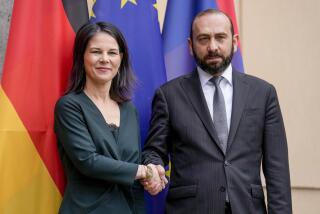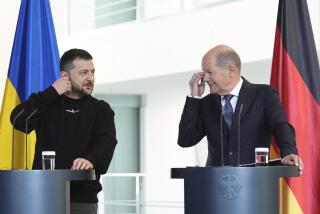Gorbachev’s Visit Surpasses Bonn’s Highest Expectations
- Share via
BONN — The visit of Soviet President Mikhail S. Grobachev to West Germany surpassed the West German government’s fondest hopes for success.
Not only did the four days of high-level talks and lower-level glad-handing strengthen the ties between Bonn and Moscow, analysts agreed Friday, but it boosted West Germany’s position within the Western Alliance as a major partner.
“Moscow & Bonn--Complete Success,” crowed the newspaper Cologne Anzeiger. And the Bonn newspaper General-Anzeiger added: “Bonn Draws Positive Balance.”
Chancellor Helmut Kohl gave a glowing report of the visit to the West German Parliament on Friday. He said Gorbachev told him that the conventional arms talks in Vienna could be successfully completed by mid-1990.
Gorbachev further said that such an agreement could be implemented a couple of years after that.
Kohl told Parliament that Gorbachev “shared my opinion that the deadlines set by President Bush--first agreement in six to 12 months and its implementation by 1992-93--are quite attainable if both sides work at it. We must keep this goal in view.”
But the main result of the visit, in West German eyes, was to place the nation in a new role: that of a kind of go-between with Moscow and Washington.
As Claus Gennrich commented in the right-of-center newspaper Frankfurter Allgemeine: “Gorbachev and Kohl managed to achieve what each of them urgently needs: a foreign policy success.”
West Germany, several commentators argued, is “moving up to the rank of partner in leadership with Washington and Moscow,” as one put it, adding, “although this does not make it a hinge between West and East, it makes it the basis for Western influence on Eastern Europe.”
Even Kohl’s political opponents, the Social Democrats, congratulated the chancellor for his talks with Gorbachev. A veteran member of the opposition, former Chancellor Willy Brandt, said that Gorbachev’s trip was “a success for the federal government, which we applaud.”
In determining how much credit Kohl and the ruling coalition will accrue from the Gorbachev visit, the first formal public reaction may come Sunday when the West German electorate votes for members of the European Parliament--and, perhaps more important, for local offices in two states: Kohl’s own Rhineland-Palatinate, and the industrially depressed Saarland.
Kohl hopes recent foreign policy successes--the favorable outcome of the North Atlantic Treaty Organization meeting in Brussels last month, President Bush’s visit, and now the enormous outpouring of public support for Gorbachev--will reverse his falling popularity at the political box office.
But even if Kohl and his Christian Democratic-Free Democratic coalition do badly Sunday, the new cordiality in Bonn-Moscow relations may give him time to improve his standing with the voters before the general election in December 1990.
More to Read
Sign up for Essential California
The most important California stories and recommendations in your inbox every morning.
You may occasionally receive promotional content from the Los Angeles Times.













